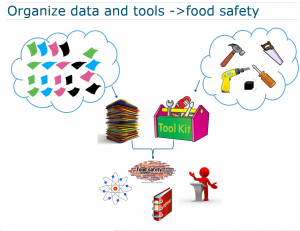RIKILT: WUR Data Champion in Food Safety Research!
“To involve researchers you need to talk about the daily research issues that we can tackle with the new data management rules”, says Paulien Adamse. Paulien is a researcher at the Business Unit Toxicology, Novel Foods & Agro, part of RIKILT. As a true Data Champion of Wageningen Research, Paulien started a project to promote Research Data Management (RDM) within the RIKILT institute.
The main goal of the project is properly organizing the folder structure and finding and training people, according to the WUR RDM regulations: “We are already using accredited research methods in our labs, and now we would like to implement the same standards for data management policy”, says Paulien. Because the research is very varied, it is a challenge to ensure a quality standard for data management. Therefore, Paulien wants to involve all research domains in RIKILT: “To secure the implementation of RDM practices in a structural way we think it is important for every project to have a project member with up-to-date knowledge on data management.”
RIKILT: research under stringent conditions
RIKILT is a research institute that carries out independent research on the safety and reliability of food. The institute plays an important role in the Netherlands, carrying out research for the Ministry of Economic Affairs and the Netherlands Food and Consumer Product Safety Authority (NVWA). Because of these statutory research tasks and the highly sensitive data, Paulien thinks that researchers are quite willing to adopt data management: “People here are used to adhering to strict rules and working with strict conditions, so new data management is not a big challenge for us”.
Data storage during research: towards one data management system
Paulien: “We also implement a special ‘RIKILT food safety’ database. In the database we store the metadata of all RIKILT datasets as FAIR as possible, in a way that researchers can access, use and share their data”. RIKILT stores data in a Laboratory Information Management System (LIMS), on the WUR-IT W:\\drive, on external hard drives, and in physical lab journals.

LIMS is an Oracle database with especially statutory research data. Paulien is working towards improving the standardisation of storage of data files and reducing the use of external hard drives and paper copies. The underlying storage environment is the regular WUR-IT storage facility (W:\\drive). “I want to improve our file and version management. Some project members already attended WUR’s RDM course where they were presented with several examples of how researchers can order and version their files properly. We share this workflow with our new employees”.
“RIKILT is making a very serious effort to make data storage during research consistent with the new data management regulations. Not yet all data are stored on the WUR-IT W:\\drive, but the idea is that this will be the case in the near future”
Data archiving after research: openness versus data sensitivity
“Our data is internal and confidential. That’s why we prefer to talk about FAIR data instead of Open Data. The Dutch government is our main project initiator and owner of the data.” For example, RIKILT researchers have recently been testing eggs for fipronil. This kind of research data is highly sensitive. Paulien: “We’ve reported the research results to the NVWA. The data is securely stored and can only be accessed by RIKILT staff members with special authorisation.” For other projects, part of the data enters the KAP database (Quality Program Agricultural Products). This Dutch national database contains information on food, residue policy, residue regulations and quality management in the Dutch agribusiness.
“The new WUR archiving regulations to archive data underlying a publication in a FAIR manner, cannot be made applicable for RIKLIT because of the highly sensitive data. However RIKILT data underlying a publication can be retraced by RIKILT staff members. Thus RIKLIT complies with the Dutch Archive law.”
WUR is serious about data
With this series on WUR Data Champions, we give you practical information on how some pioneers within our organization work on the implementation of the new RDM policy. Not every step is perfect; the championship lies in the serious effort and engagement. Please also read the blogposts on the other WUR data champion: Plant Developmental Systems. And stay tuned: more data champions to come!
Data Management Support?
Do not hesitate to contact Data Management Support with any questions and join the RDM group on Intranet to stay informed.


